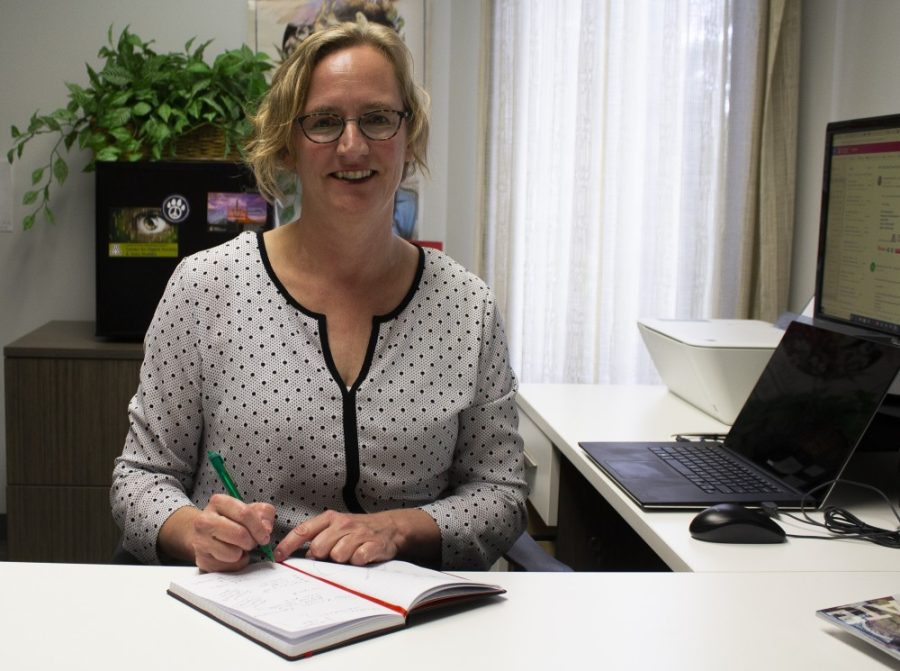Catherine Brooks was appointed director of the School of Information at the University of Arizona last December and talked with the Daily Wildcat about her plans as director and what the role entails.
The interview is given below and has been edited slightly for clarity.
Daily Wildcat: Can you tell me a bit about the iSchool and your role as its new director?
Catherine Brooks: The School of Information is the only iSchool in the Southwestern United States … In iSchools, we teach about information. Here at the UA, we have six programs. We have a long-standing master’s degree in library and information science, we have a master’s of science in information, a Ph.D. in information, and then we have three undergraduate degrees. Across all programs we aim to teach and do research on topics that rest at the intersection of technology, information and people. Often times we get the question of “What are we not?” Well, we’re not computer science, we’re not marketing, not fine arts. What we are is information science. We make information accessible for other people. We bring data together and make it usable for people and also in problem-solving situations, so we try to address big questions of the day in society.
RELATED: Q&A: Plant Science professor appointed Honorary Dean at Henan University in China
Information Science is a broad discipline that is about making sure that information is findable and useable and managed and preserved and made available for users of various types to bring about certain outcomes. One of our degree programs in particular is a little more culturally and, I would say, directed towards issues of culture and digital enterprise in society. That’s information science and eSociety. In that degree, we cover issues in human behavior like surveillance and managing privacy but also things like digital marketing and digital storytelling and online content, not just in social media, but across different kinds of platforms to bring about change or some sort of impact. So it’s a little bit like marketing but very different from, say, a marketing degree you would get at the College of Business.
DW: How has it been so far as director?
CB: I’ve been the new director for about a month, and I’ll say it’s been a challenge, but it’s been an enjoyable job, a rewarding job as well. My main goal in the job is to support the faculty here, because by supporting the faculty, they can better support our students and get their research done to really make a difference in the region, in our community and in the world.
DW: You do research that focuses on issues of language and culture. Can you tell us about that?
CB: I come from a communication and education background where I became interested in teaching and learning in online environments and issues of communication and community that happen in online contexts more generally. My focus in my own research is on the way people use language to convey notions of themselves and to convey messages and to situate others in the world in their talk. While being director makes it difficult to do a lot of research, my intention is to maintain my own research trajectory. My most recent research interest is relative to the ways that we share false information, and, in addition to fake news and false information generally, I’m very interested in fake video moving forward.
RELATED: UA student Chris Harper shares his passion for the stage
DW: What is one piece of advice you wish someone would have given you as a college student?
CB: I wish someone had reminded me to enjoy it. I think that I was a good student. I did my homework, I liked to organize my notes, but I often missed class, and I regret that now, because I would’ve gotten more out if it had I been in the room for every class session. I passed, I was somehow able to get my bachelor’s and then my master’s and then my Ph.D., but I wish I had enjoyed it a little bit more along the way.
DW: Is there anything you want to add?
CB: You know, I think this is an exciting time for information. The study of information is changing every year, the world is changing. The amount of information I can house in my purse or on my mobile phone is amazing compared to what it was a decade ago. To be an information school in the Southwest to me moving forward means being a leader in the region, and I’m excited about that. I’m excited about really drawing on the synergies in this area across industries so we can really work together, and I think that’s going to directly influence not only the University of Arizona, but Arizona more broadly.
Follow Sofia Moraga on Twitter









